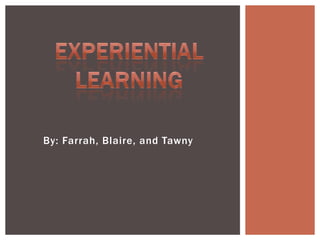
Eme2040 module 13: Team 3
- 1. By: Farrah, Blaire, and Tawny
- 2. ORIGINATOR OF EXPERIENTIAL LEARNING THEORY David A. Kolb gets the David A. Kolb (1939- credit for being the present) creator of this theory, but he was assisted by Ron Fry. The Experiential Learning Theory emphasizes the ideas of John Dewey, Jean Piaget, and Kurt Lewin. www.web.cortland.edu/andersmd/learning/Kolb_files/image002.jpg
- 3. EXPERIENTIAL LEARNING(KOLB) Kolb’s experiential learning style theory works on two different levels: a four stage cycle of learning and four separate learning styles. The theory is concerned about the learner’s internal cognitive progresses. “Learning is the process whereby knowledge is created through the transformation of experience” (David A. Kolb, 1984).
- 4. EXPERIENTIAL LEARNING(KOLB) Kolb’s four stage learning cycle: 1. Concrete Experience- “DO”(a new experience in a situation is encountered, or a reinterpretation of an existing experience) 2. Reflective Observation- “OBSERVE” (inconsistencies between experience and understanding ) 3. Abstract Conceptualization- “THINK” (reflection gives rise to a new idea, or a modification of an existing abstract concept) 4. Active Experimentation- “PLAN” (the learner applies them to the world around them to see what results)
- 5. KOLB’S EXPERIENTIAL LEARNING CYCLE www.learning-theories.com/experiential-learning-kolb.html
- 6. LEARNING ST YLES DESCRIPTIONS Assimilators- Students who learn best when material is presented in a lecture. Divergers- Students who learn best when they brainstorm and they prefer to work in groups. Convergers- Students who learn best when experimenting with new ideas. Accommodators Students who learn best while working “hands on”.
- 7. LEARNING ST YLES CYCLE www.tsegaygirmay.com/2010/09/15/teaching-and-learning-in-higher-education-workshop-in-bahir-dar-university/
- 8. KOLB’S THEORY IN THE CLASSROOM: TEACHER USE Without Technology: A teacher can determine which of the 4 learning styles each student falls under Teachers can use hands on exercises such as a lab experiment to put concrete experiences into use After concrete comes reflective, teachers can assign a written assignment or a group discussion reflecting on what was performed Teachers can organize an abstract group discussion where students theorize about the assignment and the outcomes of it Following abstract thinking, teachers can have students develop an active plan to test their theories, which leads back to concrete Experiences.
- 9. KOLB’S THEORY IN THE CLASSROOM: TEACHER USE With Technology: Teachers can use the theory of concrete experiences by having the students play computer role-playing games Next is the reflective theory, teachers could have students reflect on their experiences virtually with other students who have completed the same exercise For the abstract theory, teachers can have the students play a simulation computer game Similar to abstract, the teacher can have to students play a computer game to help them develop a plan for active experimentation
- 10. KOLB’S THEORY IN THE CLASSROOM: STUDENT USE Without Technology: Students can participate in hands on experiments Students can also complete written assignments to reflect on concrete experiments Students can participate in group discussions to use abstract theory With Technology: Students can participate in simulated computer games to understand abstract theory Students can also use virtual chat rooms to use and understand the reflective process
- 11. KOLB’S THEORY IN THE CLASSROOM: PERSONAL USE This theory would be very beneficial for personal teaching in the future It could be helpful in determining which way to teach students because you can figure out their learning style Also gives a basis of four steps to take when teaching students a new topic or new project Kolb’s theory is very helpful and should be used in each classroom and will be incorporated into mine
- 12. SOURCES http://www.learning-theories.com/experiential-learning- kolb.html www.web.cortland.edu/andersmd/learning/Kolb_files/image0 02.jpg www.learning-theories.com/experiential-learning-kolb.html www.tsegaygirmay.com/2010/09/15/teaching -and-learning- in-higher-education-workshop-in-bahir-dar-university/